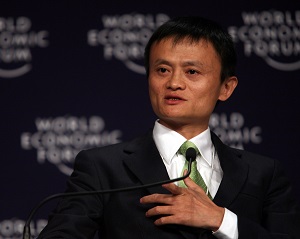China FDA will apparently head back to the drawing board for an electronic drug tracking system after complaints surfaced earlier this month that a unit of Alibaba Group ($BABA) that designed the current one has gained an unfair trade advantage.
 |
| Alibaba's Jack Ma |
In a formal notice, CFDA said it has placed a "moratorium on the implementation" of the Product Identification, Authentication and Tracking System known as PIATS that was designed by Hong Kong-listed Alibaba Health Information Technology, or Ali Health.
Late last month, CFDA said it would no longer work with the company on the effort to detect fake products, reports said, after a lawsuit was filed saying the initiative gave it an unfair advantage over other drug sellers.
CFDA Vice Director Sun Xianze held a confab with 20 pharmacy and drug companies and wholesalers on Jan. 27 at which the decision was announced to scuttle the project launched in 2013, according to reports.
However, the formal notice released on Feb. 22 caught the market by surprise, and shares in Ali Health fell a tad more than 16%, according to the Wall Street Journal.
Hangzhou, China-based Alibaba Group retains big plans for healthcare in China, including a pilot medical service launched last month that promises a patient can visit a doctor online and get a prescription filled the same way with home delivery and payment to boot, Caixin online reported.
It's unclear if PIATS is part of that effort or others designed to sell drugs online, but the WSJ said the overall efforts to enter the space "appear to be backfiring."
In the case of PIATS, CFDA runs the system to track data on manufacturing source, type of product and expiration data and precedes the Ali Health venture launched in 2014.
In July of last year, Alibaba Group moved to get a controlling stake in Ali Health as part of a long-term play in the hopes that online dug sales will be approved, while in the meantime working on offering online over-the-counter sales.
In April of 2015, Alibaba Group transferred its China online pharmacy business from Tmall to Ali Health for $2.5 billion of newly issued shares and convertible bonds that if fully utilized would take its stake in Ali Health well above 50% from around 38%.
An Alibaba spokesman declined to comment.
But the firm is just one of many potential players in the space that also includes Hangzhou-based GuaHao.com, which raised $394 million in venture financing in September last year for an online healthcare play called WeDoctor.
As well, Beijing-based JD.com is active in over-the-counter deliveries and eager in the broad healthcare space
- here's the CFDA release (Chinese language)
- here's a story from the Wall Street Journal